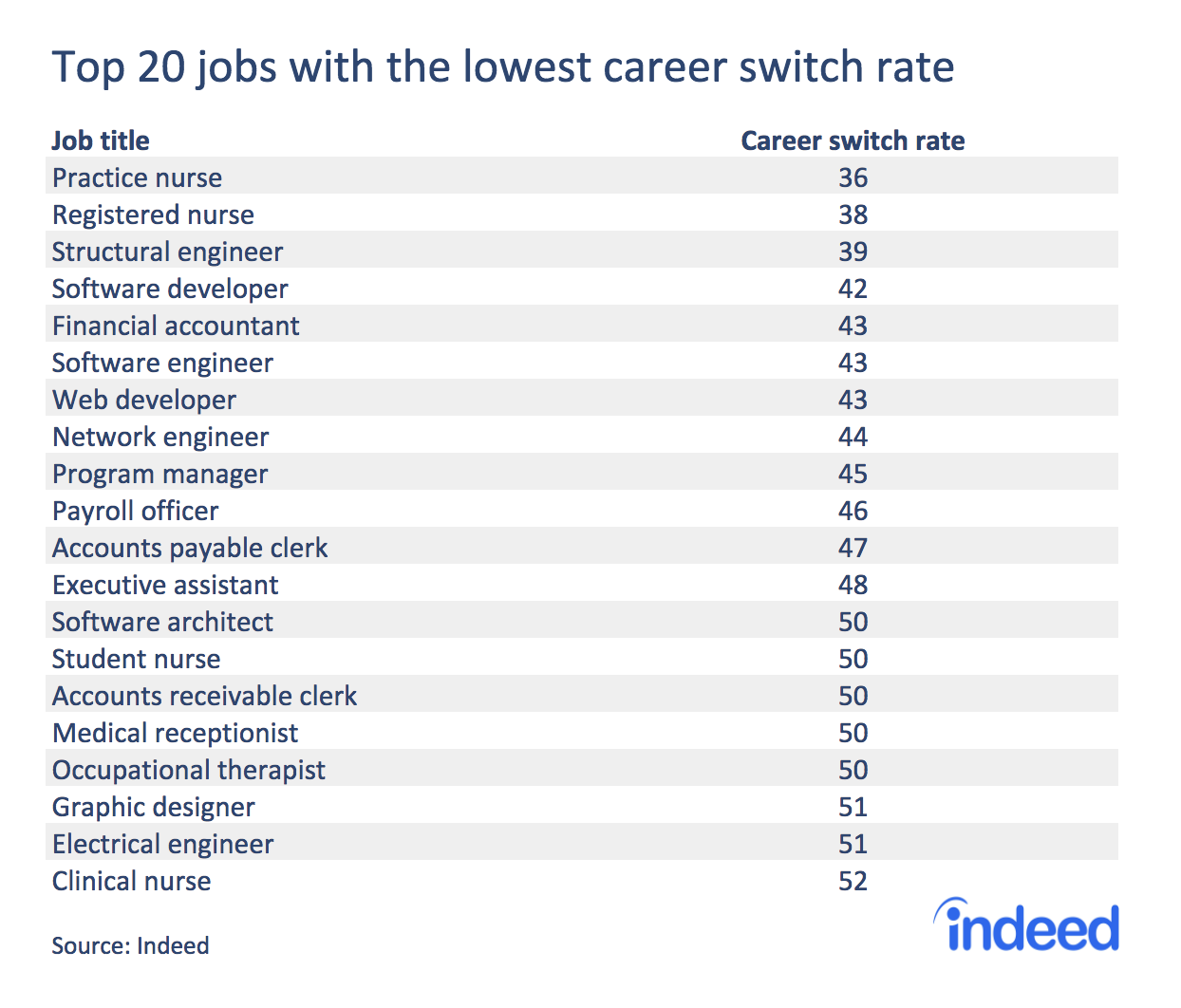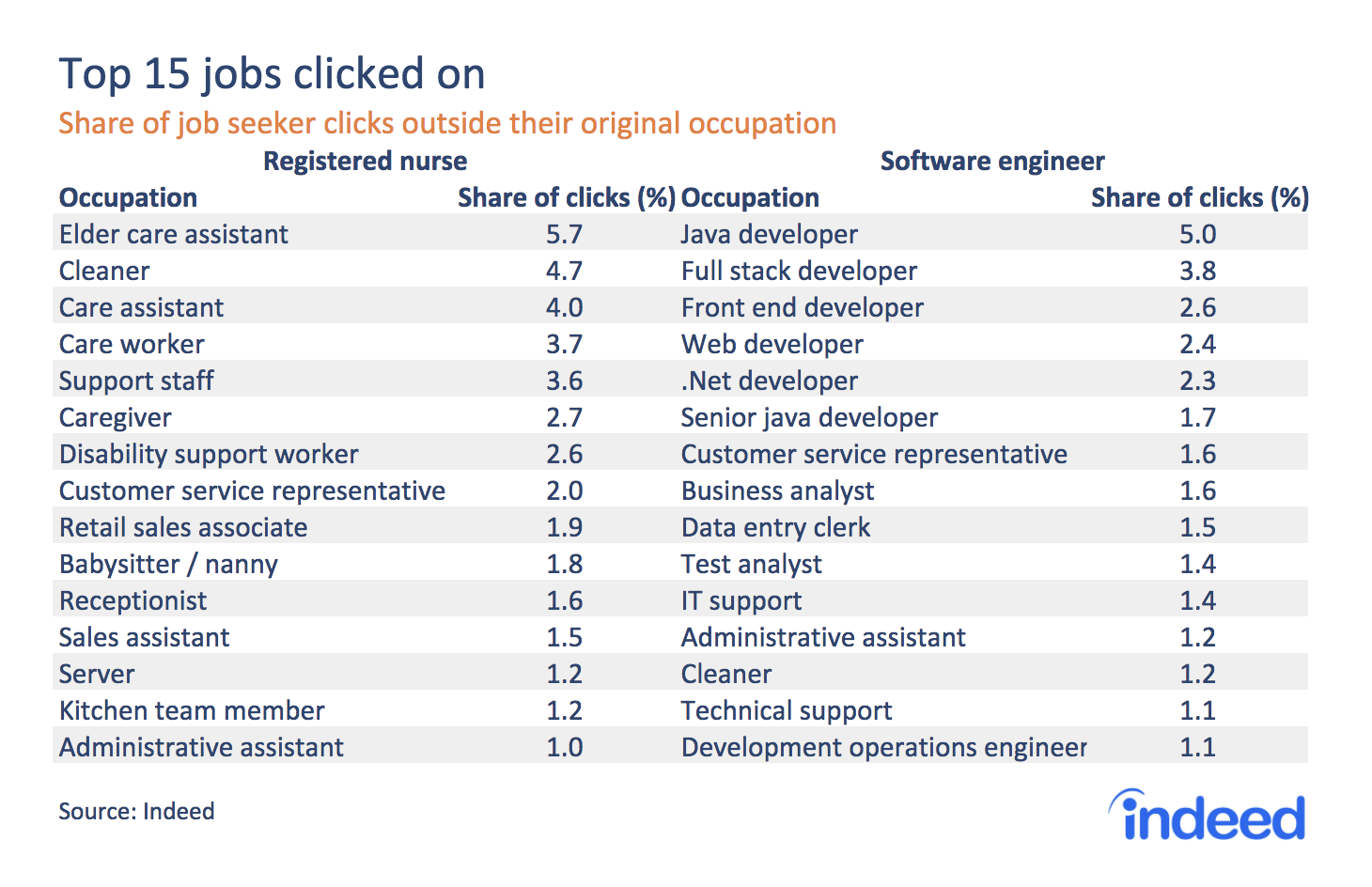Key points:
- Nurses and engineers are among those workers least likely to switch careers. Most of the occupations with a low career switch rate are highly skilled and high-paid.
- Nurses show a preference for providing care even when they consider a career change. Disability and elderly care are two common paths for former nurses.
- Workers change careers for a variety of reasons. Higher pay and career advancement are two of many reasons why workers consider switching careers.
Most people contemplate a career change at some point. According to data from the Australian Bureau of Statistics, 3.3% of Australian workers not only changed employers but also occupations in the year ended February 2017. A further 1.3% found a new occupation internally. But some occupations inspire loyalty more than others. Nurses and engineers are among those workers least likely to switch careers, rarely searching for jobs outside their immediate professions. Of course, sometimes the decision to switch careers isn’t really a choice at all, but a matter of necessity.
Utilising resume data uploaded by Australian job seekers on Indeed, we examined the search behaviour of those looking for work in 2016 and 2017 to determine how frequently they clicked on positions outside their immediate professions. Here is what we found:
- Nurses and engineers, along with tech workers and accountants, were the workers least likely to switch careers.
- Even when nurses do change careers, they gravitate toward roles that involve caring for others. Many nurses clicked on jobs in elderly or disability care, which utilise many of their existing skills.
- Software engineers, one of the occupations with a low switch rate, tend to seek other tech roles, such as java developer, when they look elsewhere.
- Some common jobs, including customer service and retail, tend to rank highly across a range of job seekers, indicating that some people looking for work switch careers because of factors other than compensation or career progression.
Jobs people don’t want to leave
A pair of nursing professions–practice nurse and registered nurse–were the two occupations in Australia which people were least likely to leave for other lines of work. Just 36% of practice nurses and 38% of registered nurses searched for alternative careers in 2016 and 2017. Two other nursing roles–student nurse and clinical nurse–also featured prominently among those jobs that workers rarely left.
Engineers also ranked well. The switch rate was just 39% for structural engineers, while software engineers came in at 43%, and electrical engineers at 51% each. Software developer and financial accountant rounded out the five jobs with the lowest career switch rates at 42% and 43% respectively.
A common feature of the occupations in the table below is that they are highly skilled and often high-paid roles. Many require years of training or very specific skill sets, which may make it difficult to switch careers.

We don’t know what motivates the job switchers in our study. Everyone has their own reasons for contemplating a career change. Yet clearly some occupations more than others encourage workers to stick around. An earlier Indeed study of the United States came to a similar conclusion: Workers in nursing and tech don’t often look elsewhere.
What jobs do nurses and tech workers click on?
One of the reasons people might be reluctant to leave nursing or tech roles is because those fields offer a wealth of opportunities. Both the healthcare and tech sectors are growing rapidly. Earlier this year, we looked at the high demand for and shortage of nurses. Nursing ranked as the occupation with the highest number of job postings on Indeed. We also examined the surging demand for tech professionals, with opportunities up 12.5% over the past two years.
Nevertheless, some nurses and tech workers do search elsewhere. Focusing on ‘registered nurses’ and ‘software engineer’, two of the largest occupations in the healthcare and tech sectors, we assessed which jobs these workers were clicking on outside their industry.
When nurses searched elsewhere, they had an eye on roles that provide care to others. Led by elder care assistant, with 5.7% of clicks, six of the top seven roles involved caregiving.
Software engineers also gravitated toward roles that utilise their existing skill set. Tech roles accounted for the top six occupations that software engineers clicked on when considering a career switch. Java developer ranked first, with senior java developer also ranking highly. Full stack developer and front end developer–two of the hottest occupations in tech right now–rounded out the top three.
There are also a sizable number of registered nurses and software engineers who clicked on jobs such as cleaner, administrative assistant and customer service representative even though these occupations call for a vastly different skill set.

The points in common in the two lists suggest that many workers who seek a career switch do so because of factors other than higher pay and career advancement. It is easy to understand the process through which a nurse becomes an elderly or disability care worker. It is harder to make sense of why a nurse would choose to become a cleaner or receptionist unless something other than money or career progress were at play.
It’s a reminder that a range of reasons may explain why job seekers would consider changing careers. Career progression, including compensation and career advancement, is obviously one reason. But other people might be motivated by bad experiences in their current fields or external factors, such as redundancy, health or relocation. Others may want to relieve stress, improve job security or find greater work/life balance.
Our data indicate that both nurses and software engineers are reluctant to change careers. When they do, they mainly gravitate toward roles that utilise their existing skill set instead of seeking an entirely new career path. The few who leave their profession often seek entry-level positions, which may be evidence of changing personal circumstances. For example, they may need greater flexibility after having children or may want a job after relocation.
Methodology:
This analysis is based on over one million resumes uploaded to the Indeed website by Australian job seekers. By identifying the specific job titles of these workers, such as ‘registered nurse’ or ‘software engineer’, we examined their search behaviour in 2016 and 2017 to determine how frequently they clicked on positions outside their immediate profession. For this study, we looked at the top 300 job titles of Australian job seekers with at least a bachelor’s degree.
The analysis of ‘registered nurses’ and ‘software engineers’ goes one step further by identifying the specific occupations that these job seekers clicked on outside their existing professions.
